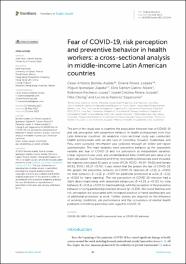| dc.contributor.author | Bonilla-Asalde, César Antonio | |
| dc.contributor.author | Rivera-Lozada, Oriana | |
| dc.contributor.author | Ipanaqué-Zapata, Miguel | |
| dc.contributor.author | Castro-Alzate, Elvis Siprian | |
| dc.contributor.author | Pacheco-Lopez, Robinson | |
| dc.contributor.author | Rivera-lozada, Isabel Cristina | |
| dc.contributor.author | Chong, Félix | |
| dc.contributor.author | Ramírez Sagastume, Lucrecia | |
| dc.date.accessioned | 2023-10-18T15:22:31Z | |
| dc.date.available | 2023-10-18T15:22:31Z | |
| dc.date.issued | 2023-06-15 | |
| dc.identifier.uri | https://hdl.handle.net/20.500.13053/9568 | |
| dc.description.abstract | “The aim of this study was to examine the association between fear of COVID-19
and risk perception with preventive behavior in health professionals from four
Latin American countries. An analytical cross-sectional study was conducted.
Health professionals with on-site care in Colombia, Ecuador, Guatemala, and
Peru were surveyed. Information was collected through an online self-report
questionnaire. The main variables were preventive behavior as the dependent
variable and fear of COVID-19 and risk perception as independent variables.
Linear regression was used, and unstandardized beta coefficient and value of ps
were calculated. Four hundred and thirty-five health professionals were included,
the majority were aged 42 years or older (45.29, 95%CI: 40.65–50.01) and female
(67.82, 95%CI: 63.27–72.05). It was shown that the greater the fear of COVID-19,
the greater the preventive behavior of COVID-19 infection (B = 2.21, p = 0.002
for total behavior; B = 1.12, p = 0.037 for additional protection at work; B = 1.11,
p < 0.010 for hand washing). The risk perception of COVID-19 infection had a
slight direct relationship with preventive behaviours (B = 0.28, p = 0.021 for total
behavior; B = 0.13, p = 0.015 for hand washing), with the exception of the preventive
behavior of using additional protection at work (p = 0.339). We found that fear and
risk perception are associated with increased practice of hand washing and use
of additional protection at work. Further studies are required on the influence
of working conditions, job performance and the occurrence of mental health
problems in frontline personnel with regard to COVID-19.“ | es_PE |
| dc.format | application/pdf | es_PE |
| dc.language.iso | eng | es_PE |
| dc.publisher | Frontiers Media S.A | es_PE |
| dc.rights | info:eu-repo/semantics/openAccess | es_PE |
| dc.rights.uri | https://creativecommons.org/licenses/by/4.0/ | es_PE |
| dc.subject | COVID-19, SARS-CoV-2, health personnel, fear to COVID-19, behavior | es_PE |
| dc.title | Fear of COVID-19, risk perception and preventive behavior in health workers: a cross-sectional analysis in middle-income Latin American countries | es_PE |
| dc.type | info:eu-repo/semantics/article | es_PE |
| dc.identifier.doi | 10.3389/fpubh.2023.1171246 | |
| dc.type.version | info:eu-repo/semantics/publishedVersion | es_PE |
| dc.publisher.country | CHE | es_PE |
| dc.subject.ocde | 3.03.00 -- Ciencias de la salud | es_PE |


